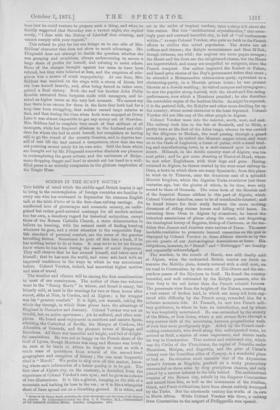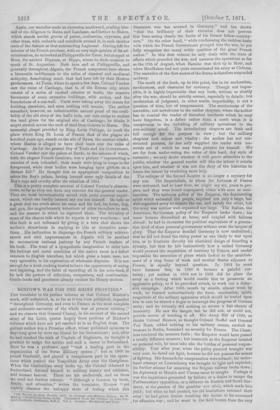SCENES IN THE SUNNY SOUTH.* THE habits of mind which
the middle-aged British tourist is apt to bring to the contemplation of foreign countries are familiar to every one who has overheard in September the common English talk at the table d'hate ot in the first-class railway carriage. An unaffected love of picturesque and romantic scenery, au undis- guised but rather good-natured contempt for all modern nations but Our own, a desultory regard for historical antiquities, except those of the Roman Catholic Church, a stern determination to believe no humbug, with the natural result of finding humbug wherever he goes, and a strict attention to the respectable Eng- lish standard of personal comfort, are the notes of the genuine travelling Briton. Sometimes he puts all this into a book, if he has nothing better to do at home. It may serve to let his friends know where he has been during the season of social dispersion. They will observe that he has amused himself, and taken care of himself ; that he has seen the world, and come safe back with an improved confidence in the ways to which he was accustomed before. Colonel Vereker, indeed, had somewhat higher motives and aims of travel.
The weather and climate will be among the first considerations to most of our countrymen. The author of these two volumes went to the "Sunny South" in winter, and found it sunny, but bitterly cold, at least in the evenings for two or three hours after sunset,. alike at Nice, in Corsica, and at Algiers ; a fur wrapper was his " greatest comfort." It is light, not warmth, taking the whole day through, in which those places have the advantage of England in December and January. Colonel Vereker was not an invalid, but an active sportsman ; yet he suffered, and often Com- plains. He found most enjoyment in southern and eastern Spain, admiring the Cathedral of Seville, the Mosque of Cordova, the Alhambra of Granada, and the pleasant towns of Malaga and Barcelona. All there was beautiful and bright, and full of delight- ful associations. Ile was not so happy on the French shore of the Gulf of Lyons, though Mentone was snug and Monaco was lovely. As soon as he lands in Africa he begins to treat us with a crude mass of quotations from several of the second-hand geographers and compilers of history ; the one most frequently cited is "Morel" We prefer to skip over all this matter, know- ing where such information of a better quality is to be got. The first view of Algiers city, on the contrary, is described from the experience of Colonel Verelter's own eyes ; and he gives us a choice of two illustrations. It is like a glacier, hanging on the side of a mountain and bathing its base in the sea ; or it is like a triangular sheet of linen spread out on a bleaching-ground. It is white, and Scenes in the Sunny South, including the Atlas Mountains and the Oases of the Sahara in Algeria. By Lioutonant-Oolouol the Hon. 0. S. Vereker, M.A., Commandant M the Limerick Artillery Militia. Loudon; Longmans. 1871.
set in the midst of tropical verdure, upon a steep hill above the blue waters. But this " architectural crystalliz Won," this seem- ingly pure and outward beautiful city, is full of " all uncleanness. within ;" E43 says Col ouel Vereker, who puts no faith in the French efforts to civilize this mixed population. The Arabs are alit ruffians and thieves; the Kabyle mountaineers and Beui M'Zab, though virtuous, are wild ; the negroes are mere pagan savages; the Moors and the Jews are the enlightened classes, but theMoors. are impoverished, and many are compelled to emigrate, since the. French conquest. Our author inspected the Kasbah or Palace, and heard grim stories of the Dey's government before that event ; he attended a Mohammedan circumcision-party, equivalent to a. christening-party, in a Moorish private house; he was present likewise at a Jewish wedding ; he visited mosques and synagogues ; he saw the popular sheep-festival, with the sword-and-fire-eating performance, over which a Marabout presided ; he also describes. the convulsive orgies of the heathen blacks. As might be expected, it is the pastoral folk, the Kabyles and other races dwelling far up. the country, whose moral character is the least depraved. Colonel Vereker did not like any of the other people in Algiers.
Colonel Vereker went into the interior, south, west, and east. The railway took him to the fair at Boufarik, and to Blida, a pretty town at the foot of the Atlas range, whence he was carried by the diligence to Medealt, the road passing through a grand mountain gorge; he visited the Mouze,ia copper mines, and went on to the Oasis of Laghouat, a forest of palms, with a small trad- ing and manufacturing town, in a well-watered spot in the arid desert. Milianah, in the fertile country west of Algiers, was his. next point ; and he got sonic shooting at Teuiet-el-ilitad, whore- he met other Englishmen with their dogs and guns. Having. returned to Algiers, he thence started by the west-coast railway to- Oran, a town in which there are many Spaniards; from this place- he went on to Tlemcen, once the luxurious seat of a splendid Moorish kingdom, which the Algerine Turks overthrew just three. centuries ago, but the glories of which, in its time, were only second to those of Granada. The ruins both of the Moorish and of the Imperial Roman edifices in this part of Algeria, which Colonel Vereker describes, seem to be of considerable interest; and ho found leisure for their study between the more exciting. diversions of riding vicious horses and killing wild boars. In returning from Orau to Algiers by steamboat, he learnt the historical associations of places along the coast, not forgetting. the theological heresy of Rogatus, bishop of Cartenua, or the tra- dition that Jaunes and Jambres were natives of Tones. The same. laudable resolution to prosecute learned researches on the spot is- displayed by Colonel Veroker in these African travels as by the pic-nic guests of our Archaealogioul Associations at home. His-. obligations, however, to "Morel!" and " Berbrugger " are frankly. and repeatedly acknowledged.
The weather, in the mouth of March, was still deadly oolas. at Algiers, when the undaunted British tourist set forth to- traverse the Metidja, plain, densely covered with a chill mist, on. his road to Constantine, by the route of Tizi-Ouzou and the stu- pendous passes of the Djurjura to Setif. lie found the country- beautiful, and well cultivated by the Kabylo peasants, who do their duty to the soil better than the French colonial farmers The panoramic view from the heights of the Zizitna, commanding. a vast extent of broken laud, in which are many hill forts cap- tured with difficulty by the French army, rewarded him for a toilsome mountain ride. At Taztualt, he met two French gentlemen, to whom he bore an introduction, and by whom. he was hospitably entertained. Ile was astonished by the scenery of the Biban, or Iron Gates, whore a salt stream flows through a. very narrow cleft of the mountains, between perpendicular walls of rock that seem prodigiously high. Aided by the French road. making contractors, who dwell along this unfrequented route, he, arrived at Setif, a station of some importance, and thence made his way to Constantine. That ancient and celebrated city, which was the Cirtha of the Phoenicians, the capital of Nutuidia under
Massiuissa, Micipsa, and Jugurtha, and the prize of Castles. victory over the Nutuidiau allies of Pompey, is a wonderful place. to look at. Its situation must resemble that of the Abyssinian
tyrant's fortress at Magdala, perched on a rocky promontory, surrounded on three sides by deep precipitous chasms, and only
joined by a narrow istlimue to the hills behind. The architectural remains of the Roman city, rebuilt by the Emperor Constantin, and named from him, as well as the monuments of the Arabian, Greek, and Punic civilizations, have been almost entirely destroyed by the Turks. But the nineteenth century has works of its own in North Africa. While Colonel Vereker wits there, a railway from Constantine to the seaport of Philippeville was opened.
Again, our traveller made an excursion southward, availing him- sielf of the diligence to 13atua and Lambessa, and farther to Biekra, 'which amide amidst groves of palms, mulberries, cypretiaes, and other trees, with orchards and cornfields around it, in such another .oasis of the Sahara as that surrounding Laghouat. Having left the interior of the French province, with no very high opinion of its ad- ministration, he embarked at Philippeville for Tuuis, but stopped at Bona, the ancient IIippona, or Hippo, whore he finds occasion to -speak of St. Augustine. Both here and at Philippeville, and generally throughout Algeria, the French conquerors have shown a blameable indifference to the relics of classical and mediezival antiquity, demolishing much that had been left by their Moslem predecessore. At Tunis, where he spent a few days, Colonel Vereker ;saw the ruins of Carthage, that is, of the Roman city, which consist of a series of vaulted cisterns or tanks, the massive basements of some extensive buildings, with arches, and the foundations of a sea-wall. Carts were taking away the stones for building elsewhere, and soon nothing will remain. The author remarked, however, an indestructible natural proof of the credi- bility of the old story of the bull's hide, cut into strips to enclose the land given for the original site of Carthage ; he thinks it might stretch across the neck of land from Goletta to Marra. The memorial chapel provided by King Louis Philippe, to mark the place where King St. Louis of France died of the plague six isundred years ago, stands on the site of Byrsa, the ancient citadel, where Marius is alleged to have shed tears over the ruins of Carthage. As for the present Bey of Tunis and his Government, Colonel Vereker saw the palace at Bardo, in the saloons of which, with the elegant French furniture, was a picture "representing a esnuaber of mon beheaded; their heads were lying in heaps in the foreground, while their bodies were hanging upon gibbets on a distant hill." He thought this an appropriate composition to adorn the Bay's palace, having learned some ugly details of the Bey'e rage and cruelty after the rebellion of 1864.
This is a pretty complete account of Colonel Vereker's observa- tions, so far as they can have any interest for the general reader. They are most inconveniently mixed with petty personal experi- times, which can hardly interest any one but himself. He tolls us a great deal too much about his meat and his bed, his horse, dog, and gun, the ungentlemanly behaviour of other travellers ho met, and the manner in which he reproved them. The triviality of some of the chance talk which he reports is very wearisome ; and this fault is not redeemed by giving it a turn that shows the author's shrewdness in replying to idle or deceptive asser- lions. Hie inclination to disparage the French military achieve- ments and civil improvements in Algeria will be ascribed to unconscious national jealousy by any French readers of his book. The want of a sympathetic imagination to eater into the feelings and moral condition of the native races is a defect common to English travellers, but which gives a harsh tone, not very agreeable, to his expressions of wholesale dispraise. It is not 'enough for a book-making tourist to have the opportunity of seeing and inquiring, and the habit of recording all in his note-book, if Jae lack the powers of reflection, comparison, and combination, Guide-books and gazetteers already cumber the library shelves.



































 Previous page
Previous page